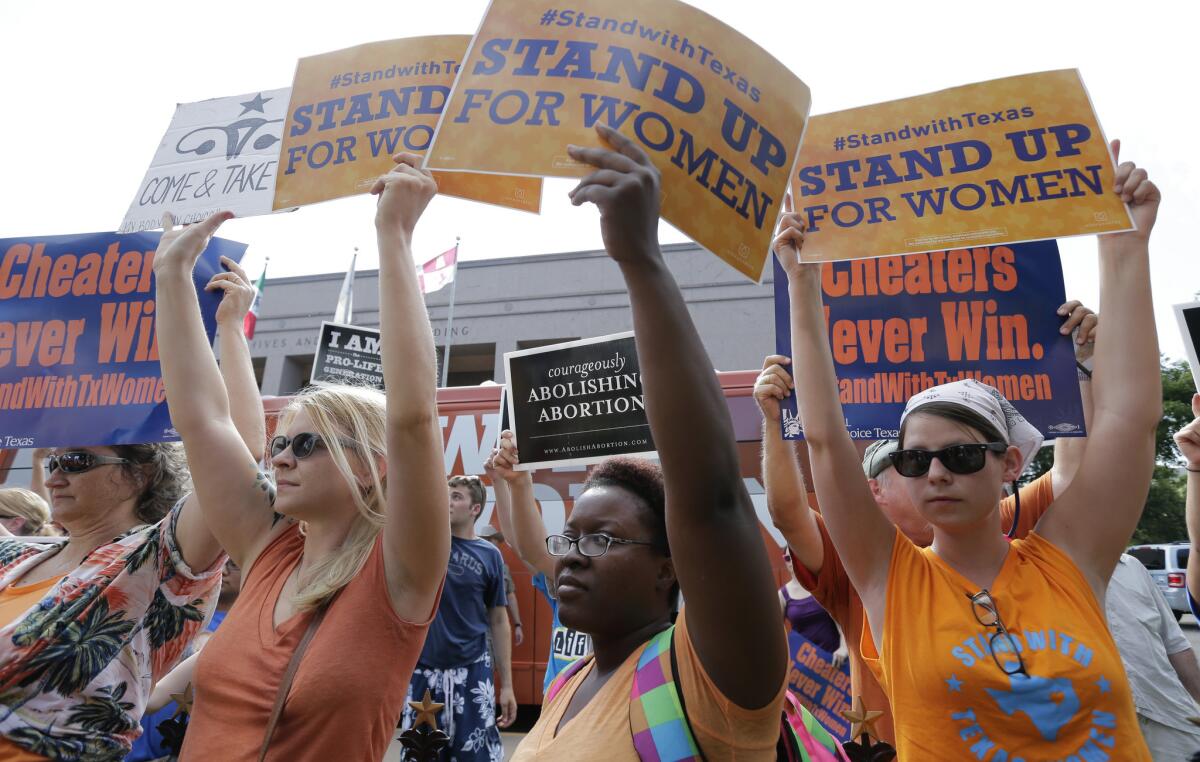Texas judge rules against portions of abortion law

Some controversial new Texas abortion restrictions are unconstitutional and will not take effect as scheduled on Tuesday, a federal judge ruled Monday.
âTodayâs ruling marks an important victory for Texas women and sends a clear message to lawmakers: It is unconstitutional for politicians to pass laws that take personal, private decisions away from women and their doctors,â said Cecile Richards, president of the Planned Parenthood Federation of America.
After Texas lawmakers approved the new restrictions this summer, Planned Parenthood and other abortion providers challenged them in court, arguing that they unfairly limited medication-induced abortion and forced doctors to have admitting privileges at a hospital near the abortion clinic where they work, in effect closing a third of clinics statewide.
Opponents did not challenge one of the most controversial provisions of the new law, which bans abortions at 20 weeks of pregnancy and is still scheduled to take effect Tuesday.
The Texas attorney generalâs office argued that the new provisions protected women and fetuses.
U.S. District Judge Lee Yeakel said in his ruling that the admitting-privileges requirement violated the rights of doctors to do what they thought was best for patients. But the judge said restrictions on medication-induced abortions should stand âexcept when a physician finds such an abortion necessary, in appropriate medical judgment, for the preservation of the life or health of the mother.â
Texas Atty. Gen. Greg Abbott, a Republican campaigning for governor, made no personal comment Monday, but a spokeswoman for his office, Lauren Bean, said the state had already filed an appeal of Yeakelâs ruling with the 5th Circuit Court of Appeals in New Orleans.
âAs everyone â including the trial court judge â has acknowledged, this is a matter that will ultimately be resolved by the appellate courts or the U.S. Supreme Court,â Bean said in a statement.
Heather Busby, executive director of Austin-based NARAL Pro Choice Texas, said opponents of the law were âvery pleasedâ that the judge had ruled against the provision requiring admitting privileges.
âThis is one of the most dangerous provisions of the law because it would have closed clinics, leaving 22,000 women without access to care,â Busby said, adding that she was âdisappointed it wasnât a more broad ruling.â
Busby said she hoped the appeals court would uphold the judgeâs ruling limiting the law.
âOur hope is that the 5th Circuit will look at how other jurisdictions have ruled on this and how damaging it can be for women, and not put politics or personal beliefs before the law,â she said.
Similar admitting-privileges requirements were blocked as a result of challenges in Alabama, Mississippi, North Dakota and Wisconsin before they took effect. State courts in North Dakota and Oklahoma have struck down restrictions on medication abortion.
Mississippi passed a law similar to the Texas restrictions last year. It faced a similar legal challenge before a federal judge blocked the law pending a trial in March. Mississippiâs attorney general asked the 5th Circuit to lift a temporary stay and allow the law to be enforced in the interim, but the court refused.
In Texas, unlike Mississippi, the judgeâs order is a final decision, meaning an appeal to the 5th Circuit would require a review on the legality of the law itself, not just an injunction to block it.
âWeâre optimistic that they will share our opinion on this issue,â said Emily Horne, a legislative associate at Houston-based Texas Right to Life.
The proposed restrictions drew national attention this summer when state Sen. Wendy Davis staged a daylong filibuster in an attempt to block them in June. Davis, a Democrat, is also running for governor.
The filibuster forced Republican Gov. Rick Perry to call a second special legislative session, where the Republican-controlled Legislature eventually passed the law.
âTodayâs decision will not stop our ongoing efforts to protect life and ensure the women of our state arenât exposed to any more of the abortion-mill horror stories that have made headlines recently,â Perry said in a statement Monday. âWe will continue fighting to implement the laws passed by the duly elected officials of our state, laws that reflect the will and values of Texans.â
U.S. Sen. Ted Cruz (R-Texas) said he hoped the appeals court would uphold the stateâs âreasonableâ law.
âTexas passed common-sense legislation to protect the health of women and their unborn children. This law is constitutional and consistent with U.S. Supreme Court precedent protecting the life and health of the mother and child,â the senator said in a statement.
[For the record, 5:26 p.m. Oct. 28: An earlier version of this post quoted Emily Horne as saying Yeakel had rejected a Texas law two years ago that required sonograms before abortions. Actually, that ruling came from a different federal judge, so the paragraph with the erroneous information has been deleted.]
ALSO:
Anti-bullying videos questioned after two studentsâ suicides
Brooklyn slayings: Neighbors say victimsâ relative struggled in U.S.
Phoenix shooting: Family of four killed by neighbor, police say
Follow @mollyhf on Twitter
More to Read
Sign up for Essential California
The most important California stories and recommendations in your inbox every morning.
You may occasionally receive promotional content from the Los Angeles Times.











